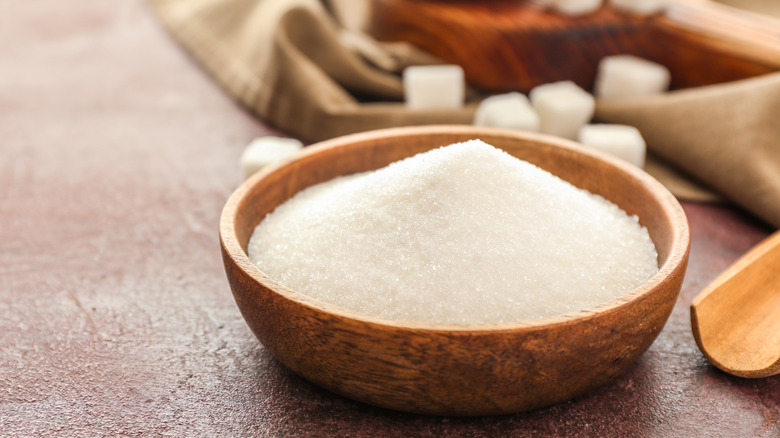The Real Difference Between Sugar Alcohol And Sugar
If you're on a journey to limit the amount of sugar in your diet, you might have encountered the ingredient, "sugar alcohol" on nutritional labels. Despite its name, it has nothing to do with alcohol, and it isn't exactly quite like sugar. So, what is the difference between the two?
Sugar alcohols, known as polyols, can appear on a food label as sorbitol, xylitol, erythritol, maltitol, mannitol, glycerol, isomalt, lactitol, or hydrogenated starch hydrolysates. With half to one-third of the amount of calories than sugar, it is often found in sugar-free or diet food products as a replacement for sugar (via University of Michigan Medicine). Some foods, such as strawberries and plums, naturally contain sugar alcohols, too.
Sugar is a carbohydrate that occurs naturally in a variety of foods including fruits, grains, and vegetables and is added to a variety of processed foods. The two forms of simple sugars are monosaccharides (fructose, glucose, and galactose) and disaccharides (lactose, sucrose, and maltose). Glucose is the simplest form of sugar, and sucrose is table sugar (via Healthline).
How the body reacts to sugar alcohol and sugar
The small intestines do not absorb sugar alcohols. In fact, most pass into the large intestine, where they ferment. High amounts can sometimes lead to gas, diarrhea, and bloating, especially in those diagnosed with irritable bowel syndrome (via Healthline). In fact, consuming too much sorbitol and mannitol might act like a laxative (via WebMD).
Since the body does not absorb sugar alcohol, it has a lower glycemic index than sugar, which makes it a better alternative for people wanting to lose weight or those with diabetes, pre-diabetes, and metabolic syndrome. On the other hand, sugar is broken down and released into the bloodstream, raising blood sugar levels. Insulin moves the sugar to cells in your body, which are either used for energy or stored for later use (via Healthline).
Sugar reacts with bacteria in your mouth, which can lead to tooth decay. Sugar alcohols do not have the same reaction, and xylitol and erythritol might even help prevent tooth decay (via Healthline).
Sugar alcohols are a safe alternative to sugar for most people, but as with everything, they should be consumed in moderation (via Shape). It's mostly about how your body reacts to them and how you feel after eating them. If you feel okay, we say go for it, but if you are running to the bathroom shortly after consuming something with sugar alcohols, then you may need to cut back.


